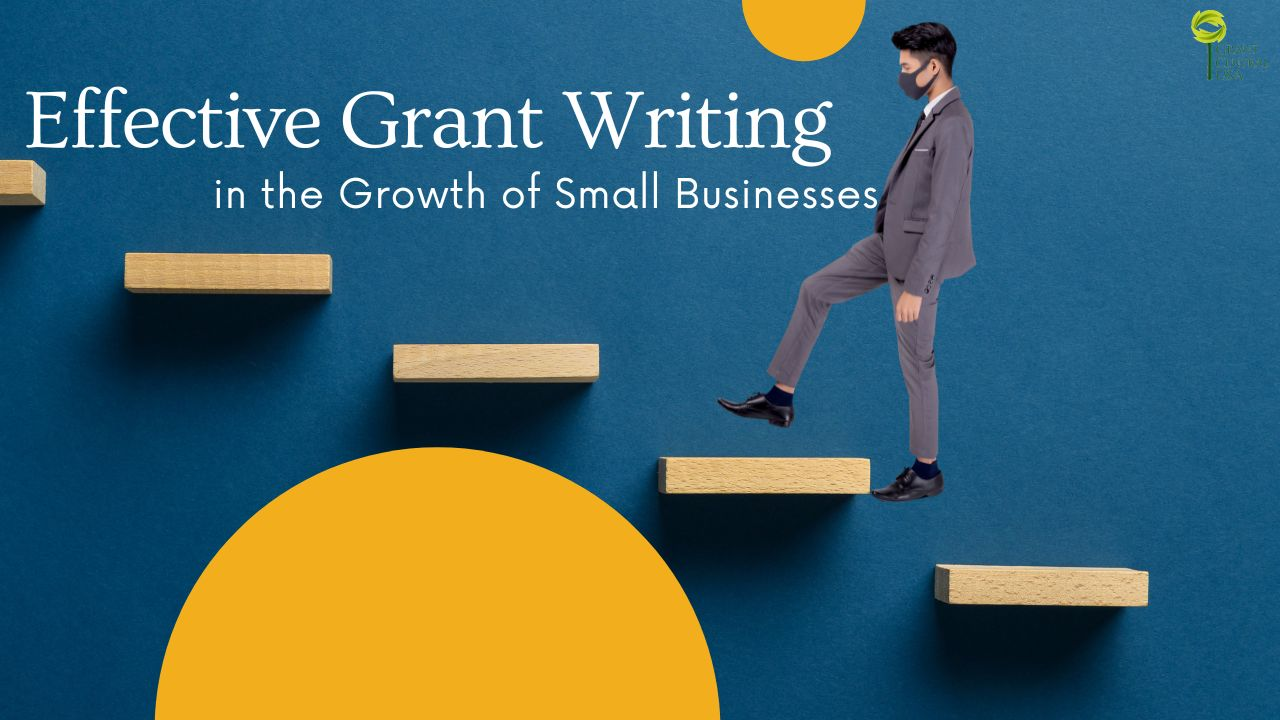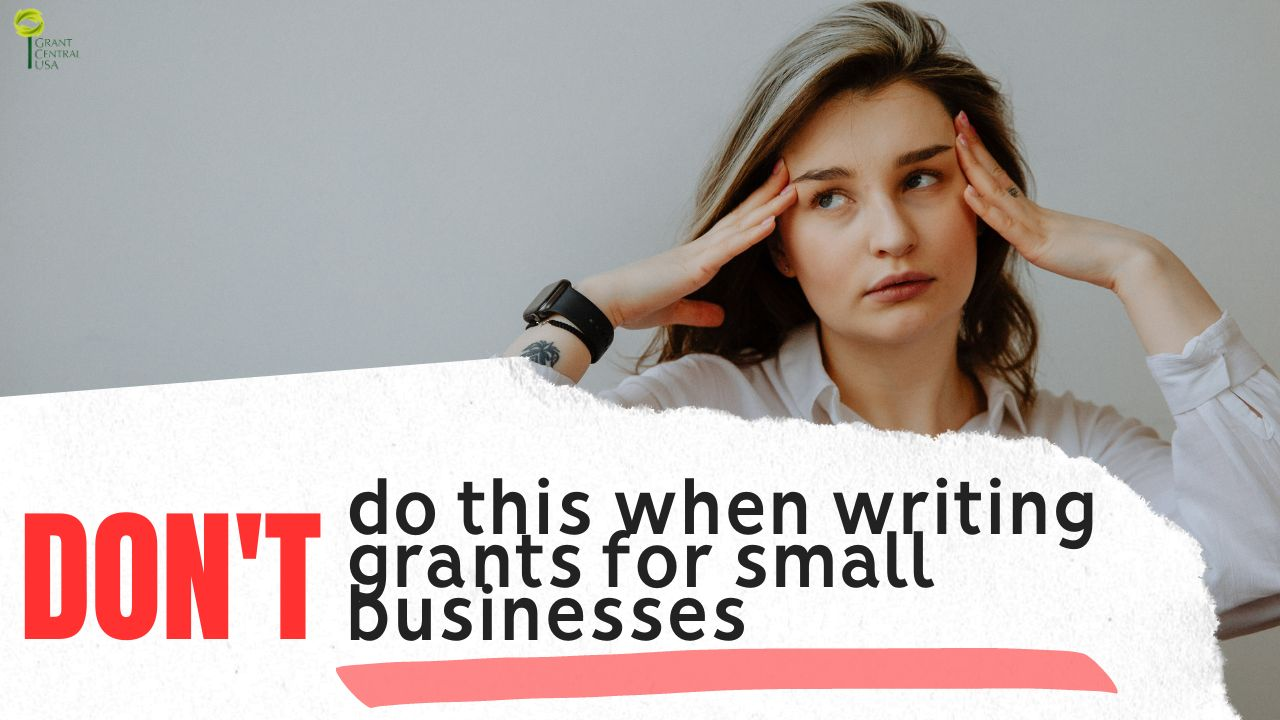The Importance of Grant Writing for Small Businesses Grant Proposals


In the challenging landscape of small businesses, securing funding is often the most formidable hurdle. This is where effective grant proposal writing comes into play, serving as a lifeline for many small enterprises. The ability to craft persuasive grant proposals can unlock substantial financial resources, which unlike loans, do not need to be repaid. This blog delves into the importance of grant writing for small businesses and the art of creating compelling grant proposals. It serves as a guide for entrepreneurs who are seeking to harness this underestimated skill to fuel their small business funding it's growth and success. With the right approach to grant writing, the potential for your small business is limitless. Let's explore how you can make this happen.
What is grant writing and why is it important for small businesses?

Grant writing is the process of applying for funding provided by an institution such as a government department, corporation, foundation, or trust. This usually involves writing and submitting a detailed proposal that outlines your business's mission, the project for which you need funding, and how that funding will be used to achieve specific goals.
For small businesses, grant writing is particularly important for several reasons:
-
Non-repayable Funds: Unlike loans, grants are non-repayable funds. This means that small businesses can use this money to grow without worrying about repaying the amount, which can be beneficial for cash-strapped startups and small enterprises.
-
Opportunity for Growth: Grants can provide the much-needed capital for small businesses to invest in research and development, expand operations, or launch new products or services.
-
Credibility and Reputation: Receiving a grant can also boost a business's credibility, making it easier to attract additional funding or partnerships.
-
Sustainability: Some grants are designed to support sustainable practices in business. If your small business is focused on eco-friendly products or operations, grants can provide significant support.
-
Community Development: Many grants aim at supporting businesses that contribute to their local community's economic development. If your small business plays a role in this, you could be eligible for such grants.
However, it's important to note that grant writing is a skill that requires time and effort to master. It involves thorough research, meticulous attention to detail, and the ability to clearly and persuasively communicate your business's vision and business plan.
How can effective grant writing contribute to the growth of a small business?

Effective grant writing is a key catalyst for the growth of small businesses. It's a strategic tool that, when wielded properly, can unlock substantial non-repayable funds in the form of grant money. This financial boost can be instrumental in helping small businesses scale, innovate, and make a greater impact.
A well-crafted grant proposal outlines the vision, mission, and objectives of a business, demonstrating how grant money will be utilized to achieve specific goals. It allows businesses to communicate their potential for growth and their contribution to their industry or community. This is where professional grant writers come into play. Their expertise in crafting compelling narratives and understanding the nuances of grant applications can significantly increase the chances of securing a grant.
Grant writing services can also help businesses navigate the complex landscape of different grants available. They can identify the most suitable funding and research grant opportunities, and tailor proposals to meet the specific requirements of each grant. This personalized approach increases the likelihood of success and can save businesses valuable time and resources.
Moreover, securing a grant not only provides financial support but also enhances a business's credibility. It signals to other potential investors, customers, and partners that the business has been vetted and recognized by a reputable institution. This can open doors to additional funding and partnership opportunities, further contributing to the business's growth.
In essence, effective grant writing can be a game-changer for small businesses. It's an investment in the business’s future, with the potential to secure crucial funding, enhance reputation, and drive growth. So whether you're hitting a growth plateau or looking to kickstart a new business venture, consider exploring the world of grant writing. With the right approach and the right support, the possibilities are endless.
What are some common mistakes to avoid when writing grants for small businesses?

to ensure your grant application stands out amidst the competition and seizes the available grant opportunities, it's crucial to steer clear of these common mistakes:
1. Lack of Alignment with Grant Objectives:
One of the most fundamental errors is failing to align your grant proposal with the objectives and priorities of the funding organization. Before diving into the application, thoroughly research the grant's focus areas and tailor your proposal to demonstrate how your project aligns with their mission.
2. Generic and Unfocused Proposals:
Casting a wide net and submitting generic proposals to multiple grants is a recipe for rejection. Each grant application should be carefully crafted to address the specific requirements and goals of the funding opportunity. A one-size-fits-all approach rarely impresses reviewers.
3. Ignoring Instructions and Guidelines:
Skipping over or misunderstanding the guidelines provided in the grant application is a surefire way to get your proposal tossed aside. Pay attention to formatting, word limits, required documents, and submission deadlines. Ignoring these details signals a lack of attention to detail.
4. Overlooking Comprehensive Research:
Insufficient research into the funding organization and its values can lead to a proposal that misses the mark. Tailor your proposal to demonstrate a deep understanding of the organization's priorities and values, showing how your project aligns seamlessly.
5. Lack of Clarity and Conciseness:
Grant reviewers often have limited time to evaluate proposals. Present your ideas clearly and concisely. Avoid jargon and convoluted language. Clearly explain the project's goals, strategies, and expected outcomes.
6. Neglecting Proofreading and Editing:
Typos, grammatical errors, and poor formatting reflect poorly on your professionalism. A sloppy proposal raises doubts about your dedication and attention to detail. Thoroughly proofread and edit your proposal before submission.
7. Disregarding Measurable Outcomes:
Failing to provide specific, measurable, achievable, relevant, and time-bound (SMART) outcomes undermines the impact of your proposal. Grantors want to see how their investment will result in tangible change.
8. Not Demonstrating Need or Impact:
Avoid focusing solely on the project's description without showcasing the actual need it addresses and the potential positive impact. Clearly outline the problem you're addressing and the solution your project offers.
9. Omitting a Strong Budget Plan:
A weak or vague budget plan raises doubts about your project's feasibility. Present a detailed budget that aligns with your project's scope and objectives. Ensure all expenses are accounted for and reasonable.
10. Last-Minute Rush:
Rushing to complete and submit a grant proposal at the eleventh hour increases the likelihood of errors and oversights. Start early, allowing ample time for research, writing, editing, and revising.
In the quest for grant funding, avoiding these common mistakes can significantly enhance your chances of success. Grant writers for small businesses, whether professionals or internal team members, must be vigilant in addressing these challenges. By meticulously tailoring your grant proposal, adhering to guidelines, and demonstrating your organization's dedication, you position your small business for consideration in the competitive world of small business grant writers and applications.
What types of grants are available for small businesses?

Exploring Avenues: Diverse Grant Opportunities for Small Businesses
In the realm of small business growth, grant proposals present a gateway to securing essential funding from a plethora of sources. From local governments to federal and state, government agencies to private foundations, the opportunities to obtain financial support are diverse and dynamic. Crafted with precision and aligned with specific goals, grant proposals can pave the way for small businesses to access funding across various grant types. Let's delve into some of the avenues available:
1. Government Grants:
Local, and state governments, and federal government agencies often provide grants to stimulate economic development, job creation, and innovation. These grants may focus on areas such as technology adoption, sustainable practices, or workforce training.
2. Small Business Administration (SBA) Grants:
The U.S. Small Business Administration offers various grant programs, particularly for research and development, exporting services, and disaster recovery. These grants can provide a significant boost to businesses in need.
3. Industry-Specific Grants:
Numerous industries offer grants tailored to their unique challenges and opportunities. Whether it's healthcare, technology, agriculture, or arts and culture, businesses can find state grants here that cater to their specific needs.
4. Non-Profit Organizations:
Many non-profit organizations offer grants to businesses private organizations that align with their missions. These grants may support initiatives related to community development, education, or social welfare.
5. Private Foundations:
Private foundations, established by philanthropists and corporations, give free money and provide grants to advance specific causes. Businesses can find opportunities in areas like education, environmental conservation, healthcare, and more.
6. Research and Development Grants:
These grants are aimed at fostering innovation and advancements in technology. They're particularly valuable for businesses engaged in scientific research, product development, and technological breakthroughs.
7. Community Development Grants:
These grants typically focus on improving local communities through economic revitalization, job creation, and infrastructure enhancement. They're often provided by local government agencies or community development organizations.
8. Start-up and Early-Stage Grants:
Some federal grants that are designed specifically for start-ups and early-stage businesses. They offer support during the critical initial phases of business development.
9. Environmental and Sustainability Grants:
As sustainability gains prominence, grants supporting eco-friendly business plan and initiatives are becoming more prevalent. Businesses focused on green practices, renewable energy, or waste reduction can find suitable grants.
10. Innovation and Technology Grants:
Grants in this category encourage businesses to adopt cutting-edge technologies, driving growth and competitiveness in the digital age.
To access these grants, small businesses need to be proactive in researching available opportunities, understanding eligibility criteria, using financial statements, and meticulously writing grant proposals that articulate their vision and goals. The art of finding and writing grants goes hand in hand – discovering suitable opportunities is the first step, followed by the eligibility requirements and crafting compelling proposals that resonate with the funders' objectives. As the landscape of grant opportunities continues to evolve, small businesses equipped with strategic grant writing skills can unlock a world of financial support, propelling their growth and innovation.
Should you hire a professional or write your own grants for your small business?

The decision to hire a professional grant writer for small business grants or to write your own small business grants, for your small business is dependent on several factors such as time, budget, and expertise. Here are some considerations to help make this decision:
Expertise other professional grant writers: Professional grant writers have the necessary skills and experience to craft compelling grant proposals. They understand the nuances of different grants and can tailor your application to increase its chances of success. If you or your team lack experience in grant writing, hiring a professional could be a wise investment1.
Time: Grant writing is a time-consuming process that involves conducting research beforehand, drafting, revising, and submitting the proposal. Small business owners often juggle many tasks. If you're pressed for time, a professional grant writer can take this task off your plate and allow you to focus on other areas of your business2.
Budget: Hiring a professional grant writer does come with a cost. According to GrantWatch, freelance grant writers can set their fees starting at $40 an hour, with the minimum cost around $500 in total3. If your budget allows, hiring a professional to write, could prove to be a good investment, especially if it results in securing a substantial grant for your company.
Complexity of the Grant: Some grants require complex applications and extensive documentation. A professional grant writer may be better equipped to handle these requirements and navigate the complexities of the process4.
In conclusion, while it's not impossible to write your own grant proposals, hiring a professional grant writer can significantly increase your chances of securing funding. However, this decision should be made considering your specific circumstances, including your budget, time constraints, and the complexity of the grants you're applying for.
What are some tips for successful grant writing for small businesses?

Writing a successful grant proposal for a small business can be a challenging task. However, there are several strategies that can increase your chances of securing funding. Here are some tips based on the sources I found:
-
Spell Out the Need for the Grant: It's crucial to articulate why your business needs the grant. This could involve explaining how the funds will help overcome a challenge or contribute to growth
-
Differentiate Yourself: Highlight what sets your business apart from others. This uniqueness can make your grant proposal stand out among many applications
-
Target a Specific Project with Your Grant Proposal: Rather than making a general request for funding, focus on a specific project or initiative. This shows that you have a well-thought-out plan for using the grant proposal
-
Do Thorough Research: Understand the mission and goals of the grant provider. Make sure your project aligns with their objectives.
-
Align Your Budget and Project Narrative: The budget should reflect the activities described in your proposal. Every expense should be justified and linked to the success of your project
-
Define Success: Describe what success looks like for your project. Include measurable outcomes to demonstrate the potential impact of the grant money
-
Tell a Compelling Story: A successful grant proposal should engage the reader and demonstrate the importance of your project. Use storytelling techniques to make your proposal more compelling
-
Follow Directions: Grant providers usually have specific guidelines for applications. Adhere to these instructions to avoid disqualification4.
-
Consider Hiring a Professional Grant Writer: If you're new to grant writing or find the process overwhelming, consider hiring a professional. They have the experience and skills to increase your chances of success
-
Study Successful Grant Applications: Look at examples of successful grant proposals to understand what works. These can provide valuable insights and inspiration for your own proposal
Remember, each grant is unique, so tailor your proposal to meet the specific requirements and expectations of the grant provider.






